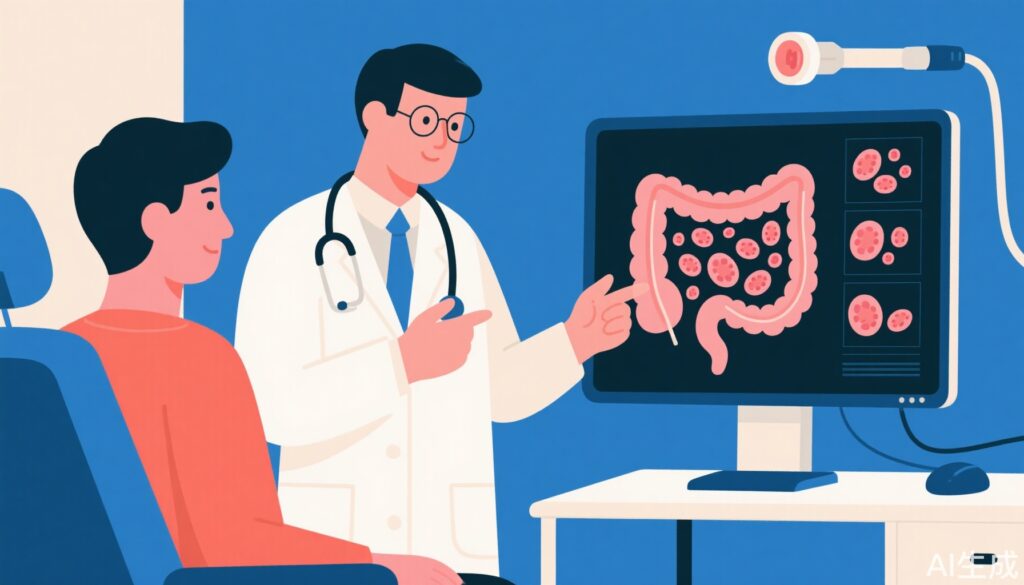Introduction
Intestinal polyps are growths that form on the inner lining of the colon or rectum. While most polyps are benign, certain types have the potential to turn cancerous and lead to colorectal cancer. Early detection and removal of polyps are crucial steps in preventing this progression. This article will discuss common symptoms indicating possible polyps, who is at higher risk, and recommendations for colonoscopy screenings.
What Are Intestinal Polyps and Why Do They Matter?
Most intestinal polyps are non-cancerous (benign). However, some types—such as adenomatous polyps and those with dysplastic changes—can develop into colorectal cancer over time. The risk increases with larger polyps (greater than 1 cm in diameter) or if there are multiple polyps (more than three).
Colorectal cancer develops slowly, typically taking 5 to 10 years for a benign polyp to transform into cancer. Colonoscopy is the most effective tool for detecting and removing polyps early, thereby preventing cancer.
Colonoscopy Screening Recommendations
– If a colonoscopy shows no abnormalities and no precancerous lesions, the next screening can be scheduled 10 years later.
– If precancerous lesions are detected, a follow-up colonoscopy is recommended within one year or combined with fecal occult blood genetic testing.
– If test results suggest abnormalities, annual examinations are advised.
– For individuals without any issues, subsequent screenings can be spaced every 5 to 10 years.
It is generally advised that individuals start screening colonoscopies at age 45, especially if they have risk factors.
Warning Signs: When to Pay Attention to Bowel Changes
1. Blood in Stool
Blood in the stool often results from bleeding blood vessels on the surface of intestinal polyps. Typical signs include dark red or mucous mixed blood stools, occasionally bright red blood if the polyp is near the anus. Many people mistake blood in stool for hemorrhoid bleeding; however, hemorrhoid bleeding usually appears as fresh, bright red drops after defecation and does not mix with stool.
2. Sudden Changes in Bowel Habits
Long-term constipation or diarrhea, alternating between the two, or a feeling of incomplete evacuation after bowel movements can be signals of polyps. Persistent changes in bowel habits over time merit medical attention.
3. Polyp Prolapse
Polyps with a stalk located near the lower rectum may protrude outside the anus during defecation. These usually appear as bright red, round, or cherry-like growths that retract back after bowel movements. Polyps without a stalk require digital rectal examination or anoscopy for detection.
4. Recurrent Abdominal Pain and Bloating
Sudden increases in intestinal motility caused by blood or inflammatory substances passing through the bowel can lead to spasmodic abdominal pain. This pain is often intense but intermittent, sometimes subsiding after a short period.
Who Is More Prone to Develop Intestinal Polyps?
1. Age over 50
Statistics show approximately 30% of people over 50 have colon polyps, increasing to 40-50% in those over 60.
2. Family History of Colorectal Cancer
Intestinal polyps have a hereditary component. Those with family members who have had polyps or colorectal cancer have a significantly higher risk.
3. Metabolic Syndrome Patients
Conditions such as obesity, high cholesterol, type 2 diabetes, and hypertension are closely linked to the development of polyps.
4. Poor Dietary Habits
Diets high in fats and sugars but low in fiber increase the risk of polyps. Smoking and excessive alcohol use further elevate this risk.
5. Chronic Intestinal Diseases
Long-standing inflammatory bowel diseases like chronic colitis, ulcerative colitis, and Crohn’s disease expose the intestinal lining to ongoing inflammation, significantly increasing polyp risk.
Prevention and Next Steps
Adopting a healthy lifestyle with a balanced diet rich in fiber, regular physical activity, and avoiding smoking and excessive alcohol can reduce the risk of polyps. Regular screenings via colonoscopy remain the gold standard for early detection and cancer prevention.
If you notice any abnormal bowel symptoms or have risk factors, consult your healthcare provider to discuss appropriate screening and monitoring strategies.


